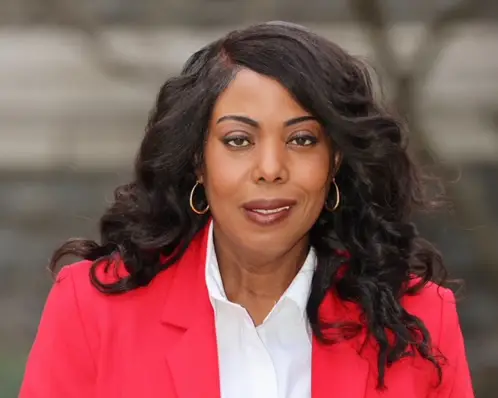Hyvelle Ferguson-Davis
A patient advocate for many stifled voices

When you hear the phrase “not a quitter,” think of Hyvelle Ferguson-Davis – not just for her efforts to restore her own health but for helping others understand and address cardiovascular risks and conditions. With cardiovascular disease the top mortality cause worldwide, her foundation Heart Sistas Inc. aims to reach many others before it is too late.
At 33 years of age, Hyvelle was dealing with a diagnosis of diabetes which led to a stroke and then, a heart attack and quadruple bypass years later.
“There were days I didn’t know if the money should go to the mortgage or the insulin, that’s how tough it has been,” says Hyvelle.
Not many people would refer to quadruple bypass surgery as a “blessing,” but Hyvelle does, anchored by her faith.
“Even on the day when my speech was “weird” as my daughter put it and my leg felt numb, and I tried to resist my husband driving me to hospital, I didn’t connect any of my symptoms to a stroke. From my hospital bed, I watched my son’s soccer team win their championship match, and I knew my habits and lifestyle had to change. And they did change, but only for a while, and then came the heart attack, when I was 41 years old.”
There was the mental and emotional toll of living with health challenges, sidelined by the pragmatic concerns of tests, medicines, and follow-up consultations. Too often, discussing fears, feelings, and depressing days does not get the priority it deserves. Hyvelle reflects on the socioeconomic barriers to prevention, diagnosis and follow-up care which persist. In rehabilitative therapy, she was the youngest and the only person of colour.
“Having your heart exposed and damages repaired are a path to a new lease on life, and to healing on many levels. I want my legacy to be a growing number of people, and especially women, who become informed and empowered to look after themselves. “Often, we women are caretakers. We remind everyone about their appointments, arrange and organise events, make sure things are taken care of, forgetting to take care of ourselves.”
Hyvelle wants people to understand that diabetes increases the risk of a stroke and cardiovascular complications, that it’s important to ask questions, to keep looking until you find the right doctor, to understand what the numbers on your medical report mean. She started reading and researching every ounce of information. She would ask her doctors to slow down when explanations were hurried, and even recorded some of her consultations.
She is brimming with curiosity, full of humour and a positive outlook that is infectious. A self-described ‘master gardener,’ she is happy tending to home-grown vegetables. Water is the drink of choice, and any fruit juices are homemade and diluted to lessen the sugar content. The lifestyle conversion was complete when her family switched from refined flour to whole grains although she jokes that they almost put her out of the house at that point – today, no one wants to turn back.
“I’m concerned when I get calls from patients who have been to the emergency room with symptoms needing investigation and no EKG is done. Not all of them have a sister like I did who demanded answers, follow-up, and solutions. Support groups like Heart Sistas reminds patients of their right to be informed, their right to care, and of the hope after diagnosis. I tell them ‘when you go to ER, say what you are feeling, tell the facts, try not to get emotional, don’t do anything that might hurt your chances of not being understood or looked after.’ It’s a pity that we have to remember that even when we are stressed and in pain, we must make this effort if we want to be taken seriously.”
With ten stents to keep her arteries open, Hyvelle has recently endured more tough news. She has the gene for LPa, or lipoprotein little a’ as it is sometimes called, a molecule that is made up of protein and fat. A genetic predisposition to elevated levels of LP(a) in the blood can cause arterial blockages and heart disease.
Always striving to stay positive, Hyvelle emphasizes the continual discoveries and the development of applications and wearables to track what’s going on inside our bodies, noting that “crucial in our arsenal is sharing information and access to the latest health tools, including digital.”
“Statistics are a cry from the grave that we can do more to improve health for everyone because so many deaths from cardiovascular conditions can be prevented. Nights were scariest, when I felt most isolated, worried that I might not wake up. Now, I relish every sunrise.”
Hyvelle Ferguson-Davis is the founder of Heart Sistas, a nonprofit organization that provides heart health education and support to women of colour across under-served and under-represented communities, and author of Stroke of My Heart – Healing after the Battle Within. She has been a patient ambassador for organisations committed to improving health outcomes, especially related to the links between diabetes, stroke and cardiovascular disease. She is a ‘Heart Hero’ for the World Heart Federation, marking World Heart Day, nominated by the Boehringer Ingelheim and Eli Lilly Alliance: